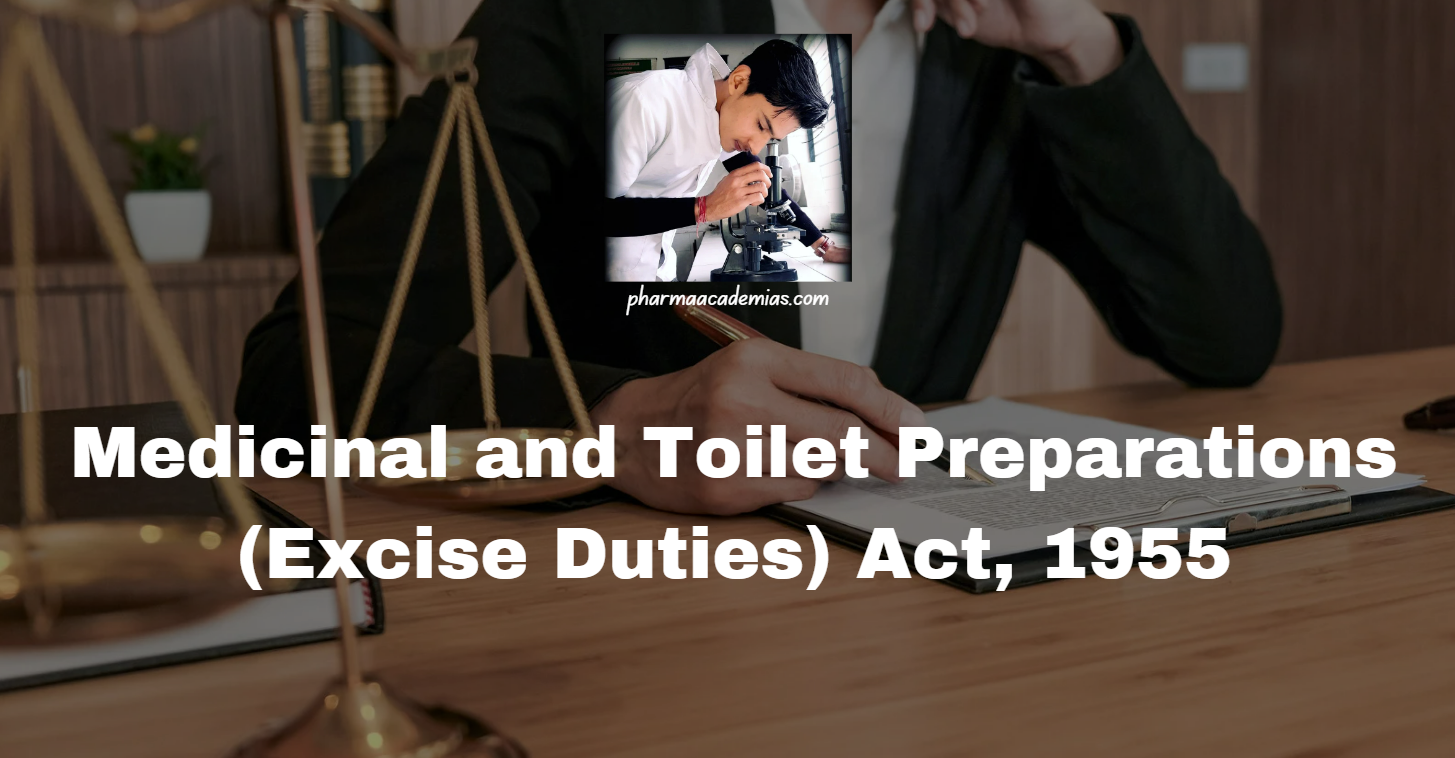The Medicinal and Toilet Preparations (Excise Duties) Act, 1955, is an Indian legislation that regulates the levy and collection of excise duties on medicinal and toilet preparations containing alcohol, narcotic drugs, or other psychotropic substances. This Act ensures that these preparations are manufactured, transported, and sold under proper supervision, thereby preventing the misuse of such substances.
Objectives of the Act
1. Regulation of Alcohol and Narcotic Use:
– The primary objective is to regulate the use of alcohol, narcotic drugs, and psychotropic substances in the manufacture of medicinal and toilet preparations.
– The Act ensures that these substances are used strictly for legitimate purposes and are not diverted for illegal use.
2. Levy of Excise Duties:
– The Act provides for the levy and collection of excise duties on medicinal and toilet preparations containing alcohol, narcotics, or other controlled substances.
– The revenue generated from these duties contributes to the state exchequer.
3. Control over Manufacture and Distribution:
– The Act seeks to control the manufacture, distribution, and sale of such preparations to prevent abuse and ensure public safety.
– It provides a legal framework for the supervision of manufacturing facilities and the transportation of these products.
4. Uniformity in Excise Laws:
– The Act aims to bring uniformity in the excise laws related to medicinal and toilet preparations across India, replacing various state laws with a single, comprehensive legislation.
Key Definitions
1. Medicinal Preparation:
– A “medicinal preparation” under the Act refers to any substance intended for use in the diagnosis, treatment, mitigation, or prevention of disease in humans or animals.
– It includes any preparation containing alcohol, narcotic drugs, or psychotropic substances used for medicinal purposes.
2. Toilet Preparation:
– A “toilet preparation” is defined as any preparation intended for use in the toilet of the human body or in perfuming apparel, which contains alcohol or narcotic substances.
– Examples include perfumes, colognes, and aftershaves that contain alcohol.
3. Excise Duty:
– Excise duty is a tax levied on the manufacture or production of goods, including medicinal and toilet preparations containing controlled substances.
– The rate of duty is specified by the central government and is collected by the excise authorities.
4. Narcotic Drugs and Psychotropic Substances:
– These terms refer to substances listed under the Narcotic Drugs and Psychotropic Substances Act, 1985, which are controlled due to their potential for abuse and dependence.
– The Act covers preparations containing these substances, ensuring their use is limited to legitimate purposes.
Licensing
1. Requirement for Licensing:
– The Act mandates that any person or entity engaged in the manufacture, distribution, sale, or storage of medicinal and toilet preparations containing alcohol or narcotic substances must obtain a license.
– Licenses are issued by the appropriate authority, usually the state excise department or a designated official.
2. Types of Licenses:
– Manufacturing License: Required for the production or compounding of medicinal and toilet preparations. The license specifies the premises where manufacturing can occur and the types of preparations allowed.
– Storage License: Needed for the storage of these preparations before sale or distribution. The storage facility must comply with the conditions laid down in the license.
– Sale License: Issued to retailers or wholesalers who intend to sell medicinal and toilet preparations. This license ensures that the sale is regulated and monitored.
– Transport License: Required for the transportation of these preparations from one place to another. The license outlines the routes, quantities, and modes of transport permitted.
3. Application Process:
– The application for a license must be submitted to the appropriate authority, accompanied by the required documents, including proof of premises, details of the preparations to be manufactured or sold, and payment of fees.
– The authority may inspect the premises before granting the license to ensure compliance with legal requirements.
4. Conditions of License:
– The licensee must comply with all conditions specified in the license, including the maintenance of records, proper labeling, and adherence to the quantity limits.
– Any violation of the license conditions can result in penalties, including the suspension or cancellation of the license.
5. Renewal of License:
– Licenses are usually granted for a specific period and must be renewed before expiration.
– The renewal process involves re-submission of certain documents, payment of renewal fees, and, in some cases, a re-inspection of the premises.
6. Transfer and Amendment of License:
– Licenses are generally non-transferable. However, in cases of change in ownership or other significant changes, the license may be amended with the approval of the issuing authority.
– Amendments may include changes in the location of the premises, the scope of manufacturing, or other details initially provided in the application.
Regulatory Control
1. Supervision and Inspection:
– The Act empowers excise officers to inspect premises, records, and goods to ensure compliance with the law.
– Inspections may be carried out at any time without prior notice.
2. Maintenance of Records:
– Licensees are required to maintain detailed records of their activities, including the quantities of alcohol or narcotics used, the production of preparations, and their sale or distribution.
– These records must be made available for inspection by excise authorities.
3. Labeling and Packaging:
– Medicinal and toilet preparations containing controlled substances must be labeled in accordance with the rules prescribed under the Act.
– Labels must include details such as the content of alcohol or narcotics, the name and address of the manufacturer, and warnings about the use of the product.
4. Seizure and Confiscation:
– In cases where there is a violation of the Act, excise authorities have the power to seize and confiscate the goods.
– Confiscated goods may include improperly manufactured preparations, unlicensed stock, or preparations not complying with labeling requirements.
5. Penalties for Violations:
– Violations of the Act can result in severe penalties, including fines, imprisonment, or both.
– Penalties may be imposed for manufacturing without a license, non-compliance with license conditions, or any other breach of the provisions of the Act.
Conclusion
The Medicinal and Toilet Preparations (Excise Duties) Act, 1955, plays a crucial role in regulating the use of alcohol, narcotics, and psychotropic substances in India. By imposing excise duties and establishing a licensing system, the Act ensures that these substances are used appropriately and legally in the manufacture of medicinal and toilet preparations. The Act also provides a framework for monitoring and controlling the distribution and sale of these products, thereby safeguarding public health and preventing misuse.

